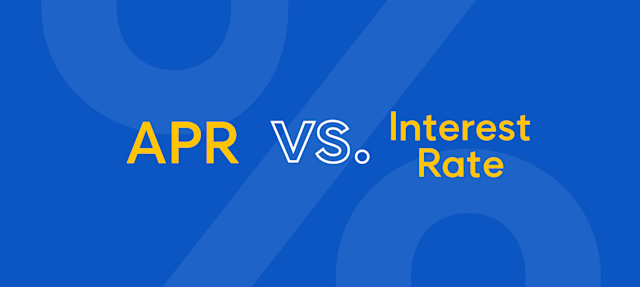How Do Personal Loan Interest Rates Work?

Summary
While interest rates are not the only costs associated with taking out a loan, it’s important to compare lenders to identify the best personal loan rates.
In this article:
Personal loans are a valuable financial tool that could help you cover unexpected emergencies like a hospital bill, car repair, or planned purchases like a vacation or new furniture. But have you ever wondered why the amount you’ve paid back on a loan is higher than the amount you borrowed? Whatever the reason for your loan, it's important to understand the cost of the money you're borrowing and how that could impact your finances in the long run.
In this article, we'll explore what personal loan interest rates are, how interest rates are calculated and strategies that may help improve your chances of getting a lower interest rate.
What is an interest rate?
At its core, an interest rate is the cost of borrowing money. When you take out a personal loan, the lender charges you interest, which is a percentage of the principal (the original amount borrowed). When you repay a loan, you usually make payments toward both the principal amount borrowed and the interest charged by the lender. Most of your payment goes toward the interest at the start of the loan repayment period, and the remainder will pay down the principal.
How are interest rates calculated?
Interest rates may fluctuate due to a change in the federal funds rate set by the Federal Open Market Committee (FOMC), which is one of the three main parts of the Federal Reserve System (The Fed).1 The Fed includes the Federal Reserve Board of Governors; the 12 Federal Reserve Banks and the 12 members of the FOMC. The federal funds rate is the target rate that banks use to borrow and lend money to one another.2 The prime rate, which is also influenced by the federal funds rate, is the rate banks charge their most creditworthy borrowers.3 There may also be shifts in market demand for loans, shifts that cause interest rates to go up or down. These changes may impact the interest rates offered by lenders, leading to changes in borrowing costs for consumers.
How do lenders determine your interest rate?
Personal loan interest rates are determined by a combination of factors, including your creditworthiness, the loan amount, the loan term and prevailing market conditions. Lenders use these factors to assess the level of risk associated with lending to you and then set an interest rate accordingly.
Borrowers with higher credit scores and lower perceived risk are generally offered lower interest rates, while those with lower credit scores may face higher rates to make up for the increased risk in lending to them.
Once these factors are determined, the interest on the loan can be calculated using daily simple interest or precomputed interest. With daily simple interest, interest accrues daily based on the principal amount. Precomputed interest, on the other hand, calculates the total amount of interest upfront for the entire loan term.
How to improve your personal loan interest rate
While factors like consumer demand, economics or world events can affect the interest rates on personal loans, you can take steps to improve your chances of securing the most favorable rate possible:
Improve your credit score: Maintaining a good credit score demonstrates to lenders that you're a responsible borrower, increasing your chances of qualifying for lower interest rates. You could improve your credit score by making on-time payments on your bills, reducing credit card balances and avoiding new credit inquiries.
Shop around for lenders: Before you settle on a loan offer, compare rates and terms from multiple lenders to find the best deal. You can shop around on the lender websites by seeing if you qualify for loan offers without affecting your credit score.
Consider a secured loan: Applying for a secured loan could reduce the lender's risk and potentially result in a lower interest rate for you because the loan is backed by collateral like a car or house. One thing to note is that if you default on a secured loan, you will lose your collateral.
Choose a shorter loan term: Paying off your loan faster may result in higher monthly payments, but you’ll likely save on interest over time, and lenders typically view loans with shorter terms as less risky. For example, if you have room in your budget, you can opt for a 3-year loan term instead of 5.
Apply with a cosigner: If you have a less-than-stellar credit history, having a creditworthy cosigner on your loan application could improve your chances of qualifying for a lower interest rate. Remember that the co-signer is equally responsible for repaying the loan, so choose someone who trusts and supports your financial goals and also understands their responsibility if you fail to make your loan payments.
Stay informed and borrow responsibly
Interest rates determine the cost of borrowing and could impact your finances, so it’s wise to be fully aware of how they work. Knowing how a lender assigns the interest rate of a personal loan can help you better understand the importance of improving your credit score to get a favorable interest rate.
Be sure to do your research, and carefully consider your options to find the best deal before committing to a personal loan. When you're ready to move forward, OneMain offers various loan options that can fit your budget and needs.
Sources:
1 https://www.federalreserve.gov/aboutthefed/fedexplained/who-we-are.htm.
2,3 https://www.investopedia.com/terms/f/federalfundsrate.asp
This article is for general education and informational purposes, without any express or implied warranty of any kind, including warranties of accuracy, completeness, or fitness for any purpose and is not intended to be and does not constitute financial, legal, tax, or any other advice. Parties (other than sponsored partners of OneMain Financial (OMF)) referenced in the article are not sponsors of, do not endorse, and are not otherwise affiliated with OMF.



